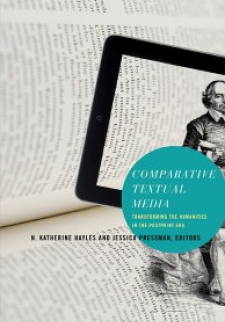Comparative Textual Media: Transforming the Humanities in the Postprint Era
N. Katherine Hayles and Jessica Pressman (editors)
2013
University of Minnesota Press

Hayles, literature professor at Duke, co-edits a collection exploring how the transition from print to digital and other mediums has affected humanities scholarship.
For the past few hundred years, Western cultures have relied on print. When writing was accomplished by a quill pen, inkpot, and paper, it was easy to imagine that writing was nothing more than a means by which writers could transfer their thoughts to readers. The proliferation of technical media in the latter half of the 20th century has revealed that the relationship between writer and reader is not so simple. From telegraphs and typewriters to wire recorders and a sweeping array of digital computing devices, the complexities of communications technology have made mediality a central concern of the 21st century.
Despite the attention given to the development of the media landscape, relatively little is being done in our academic institutions to adjust. In Comparative Textual Media, the editors bring together an impressive range of essays from leading scholars to address the issues of archiving in the digital era, of reading a digital text not for content but for traces of its underlying code, and of the connection between a child’s formation of self and the possession of a book.
